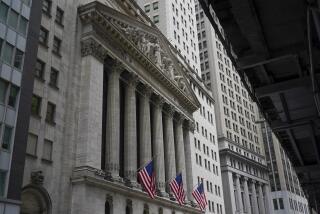Doldrums open door to mergers
- Share via
NEW YORK — The stock market’s woes this year are turning into a blessing of sorts for corporate America.
As share prices have fallen, U.S. and foreign companies have seized on the opportunity to gobble up rivals.
The latest case in point: Manhattan Beach-based sneaker seller Skechers USA Inc. on Wednesday offered to buy Heelys Inc., a maker of children’s shoes with wheels, for $143 million. Eighteen months ago, Heelys’ stock market value topped $1 billion.
The day before, drugstore chain CVS Caremark Corp. rolled out a $2.6-billion deal for Longs Drug Stores Corp., and Japan’s Mitsubishi UFJ Financial Group announced a $3-billion offer for the 35% of California’s UnionBanCal Corp. that it doesn’t already own.
Although the overall U.S. mergers-and-acquisitions market remains in the doldrums because of a drought in private-equity deals, so-called strategic mergers -- in which one company buys another, usually in the same industry -- are ahead of their pace in 2007, at least in dollar terms.
“Strategic M&A; is really where the action is these days,” said Joel Cohen, chairman of Sagent Advisors Inc., a New York-based investment bank.
This year through Monday, $800 billion in strategic deals had been announced, up 5% from $761 billion in the same period last year, according to research firm Dealogic Inc.
The deal-making has heated up as stock-market weakness has persisted. Strategic deals worth $56 billion were announced in May, June and July, easily outdistancing the $339 billion registered in the first four months of the year, Dealogic data show.
Until the credit crunch took hold last year, the stock market enjoyed a buyout mania as easy money encouraged private-equity firms -- using mostly borrowed funds -- to acquire companies at ever-higher prices. But those buyers, especially larger firms doing billion-dollar transactions, have been sidelined lately as banks shied away from financing deals.
Companies that want to bulk up, meanwhile, have been attracted by the lack of competition from private-equity firms.
“Corporate buyers were effectively squeezed out of the market for the last three years,” said Dan Alpert, managing director at Westwood Capital, an investment bank in New York. “This is their day in the sun.”
The weak dollar also is playing a role. Foreign companies are using their richly priced currencies to snap up U.S. assets.
“Even last year, before the dollar started really dropping, we saw it,” said Ravi Chanmugam, head of the North American merger practice at consulting firm Accenture. “And now you’re seeing it accelerate.”
Among the recent acquisitions by foreign firms, Anheuser-Busch Cos., the maker of Budweiser beer, agreed last month to be bought by Belgian brewer InBev for $52 billion. Also in July, Swiss pharmaceuticals maker Roche Holding offered $43.7 billion for the shares of U.S. biotech giant Genentech Inc. that it didn’t already own.
The rise of strategic acquisitions is alleviating some of Wall Street’s pain caused by the mortgage crisis and the merger slowdown. But strategic deals, in which investment banks may act only as advisors, aren’t nearly as lucrative as private-equity buyouts, which they often help finance.
“It’s nowhere near as profitable,” Alpert said. “You’re basically giving advice, and there’s a limit as to what you can get paid for advice.”
Indeed, activity in the merger business is a far cry from those heady days a short time ago.
Private-equity buyouts have slumped 85% to a measly $51.5 billion this year from $348 billion at the same point in 2007, according to Dealogic.
“For us to get back to a robust M&A; market,” said Robert Filek, a partner at PricewaterhouseCoopers, “we’ll really need to see some strengthening in the credit markets.”
--
More to Read
Inside the business of entertainment
The Wide Shot brings you news, analysis and insights on everything from streaming wars to production — and what it all means for the future.
You may occasionally receive promotional content from the Los Angeles Times.










